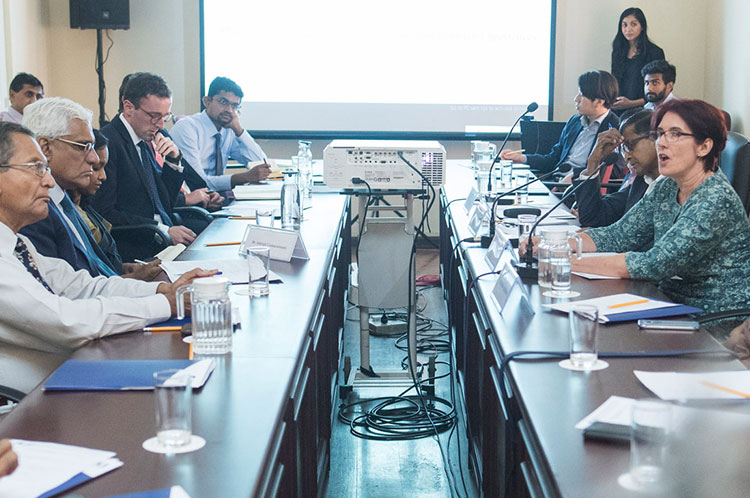Takeaways – Sirimal Abeyaratne, Amitendu Palit and Elizabeth Ward on Managing Effective Trade
September 21, 2018 Reading Time: 4 minutes

Reading Time: 4 min read
Three key takeaways from the round table discussion with Sirimal Abeyratne, Amitendu Palit and Elizabeth Ward –
- Recent developments in global and regional trade, including a potential US-China trade war, could cause major shifts in global value chains. The development could bring opportunities and challenges for Sri Lanka’s trade.
- To maximise the benefits of Sri Lanka’s National Trade Policy, which emphasises Free Trade Agreements (FTAs) as a key tool. The country should concurrently pursue gradual economic reforms.
- Sri Lanka can learn from Australia’s experiences by using public community champions to explain the benefits of trade liberalisation and FTAs to a wider audience.
Introduction
- Professor Sirimal Abeyratne, Professor of Economics at the University of Colombo; Dr Amitendu Palit, Senior Research Fellow and Research Lead (Trade & Economic Policy) at the Institute of South Asian Studies in Singapore; and Ms. Elizabeth Ward, Special Negotiator at the Office of Trade Negotiations, Department of Foreign Affairs and Trade Australia, addressed a Foreign Policy Round Table on ‘Managing Effective Trade—Sri Lanka and International Experiences,’ on 4 September 2018 at the Lakshman Kadirgamar Institute (LKI).
- The three presentations were followed by a discussion moderated by Dr. Ganeshan Wignaraja, Executive Director and Chair of the Global Economy Programme, LKI.
- The round table was attended by Dr. Indrajit Coomaraswamy, Governor of the Central Bank of Sri Lanka, representatives of the Ministry of Foreign Affairs, the World Bank, embassies, and members of the private sector and media.
Takeaways from Prof. Abeyratne’s Presentation:
- Since the early 2000s, Sri Lanka seems to have become a less export-oriented economy—its export to GDP declined by from 40% in 2000 to 21% in 2017, and contribution to South Asia’s total exports fell from 10% to 3%.
- Sri Lanka’s economic policy has become more focussed on boosting exports in the past few years. The current National Trade Policy identifies a strategy of boosting exports via FTAs with key trading partners and import liberalisation, as drivers of future economic growth.
- Abeyratne recommended that Sri Lanka should continue to engage in domestic policy reform, to maximise the benefits of the proposed FTA strategy as benefits from trade may not automatically flow to Sri Lanka.
Takeaways from Dr. Palit’s Presentation:
- Dr. Palit outlined three key developments related to regional trade agreements in Asia: (1) the likely conclusion of the Regional Comprehensive Economic Partnership (RCEP) by November 2018; (ii) the newly enforced Singapore-Sri Lanka FTA; and (iii) the prospect of an Australia-Indonesia FTA by late 2018.
- Geopolitics is becoming an increasingly important factor in trade agreements. Recent trends in FTA negotiations, particularly in the Indo-Pacific, suggests that countries are more likely to enter into trade agreements when both economic and security interests converge.
- Discussion regarding regional trade and investment agreements in Asia are increasingly being framed around the impact of a US-China trade war. Dr. Palit expects a reorganisation of global supply chains as countries and businesses work out the applicable tariffs across imports as well as exports, in the US and China.
Takeaways from Ms. Ward’s Presentation:
- Australia uses its FTA strategy to achieve specific domestic economic objectives, such as overcoming high tariff barriers for agricultural exports. It aims to eliminate 90-95% of tariffs and include the agricultural sector (which make up 2-3% of tariff lines) in all trading agreements.
- Australia’s objective is to have FTAs with 80% of its trading partners by 2020. Australian FTAs strive to be “comprehensive” (on the variety and extent of economic goods and services covered by the agreement) and of a “high quality” (in terms of access to trading markets).
- Australia’s experiences indicated that to benefit from new trade agreements, Sri Lanka should enact domestic reforms and ensure a strong policy foundation should be implemented to avoid the FTAs being viewed as an infringement on the country’s sovereignty. Sri Lanka should set clear objectives for each trade agreement, and ensure trade negotiations are nonpartisan to avoid disruptions due to changes in government.
Takeaways from the Discussion:
- Opposition towards FTAs is common across the world. Sri Lanka should concentrate on building a positive narrative on trade liberalisation by (i) appointing community champions to create awareness of the benefits of FTAs, (ii) provide details on how businesses can benefit from the agreement, and (iii) dispel any negative assumptions such as the free movement of labour.
- Sri Lanka has taken positive steps towards establishing a comprehensive trade policy framework. It has also enacted several domestic reforms including the Anti-Dumping and Countervailing Duties Act and the Safeguard Measures Act to deal with the risk of trade liberalisation.
- Sri Lanka should not rollback any of its international trade agreements, such as the SLSFTA as it would suffer reputational damage, increase the risk of capital flight, and negatively affect internationally provided services.
- Building trade negotiating capacity takes time. The government must invest in training for negotiators to equip them with the relevant skills.
Suggested Further Reading
Wignaraja, G. and Palit, A. (2018). Understanding the Sri Lanka-Singapore FTA. The Lakshman Kadirgamar Institute. [online] Available at: https://lki.lk/publication/understanding-the-sri-lanka-singapore-free-trade-agreement-fta/ [Accessed 16 September 2018].
Department of Foreign Affairs and Trade, Australia. (2017). Foreign Policy White Paper. [online] Available at: https://www.fpwhitepaper.gov.au/foreign-policy-white-paper [Accessed 16 September 2018].
Abeyratne, S. (2012). Sri Lanka’s Free Trade Agreements with India and Pakistan: Are They Leading Bilateral Trade Beyond Normalcy? [online] The Lahore Journal of Economics. 17: 315-337. Available at: https://pdfs.semanticscholar.org/9b3b/1516e13b10128540c300528d3ae6aa5192d8.pdf [Accessed 16 September 2018].
World Trade Organisation. (2016). Trade Policy Review: Sri Lanka.[online] Available at: https://www.wto.org/english/tratop_e/tpr_e/tp447_e.htm [Accessed 16 September 2018].
Brown, C. and Klob, M. (2018). Trump’s Trade War Timeline: An Up-to-Date Guide. [online] Available at: https://piie.com/blogs/trade-investment-policy-watch/trump-trade-war-china-date-guide [Accessed 16 September 2018].
China Global Television Network. (2018). Trade War or No Trade War: One-on-One with Ex-WTO Chief Pascal Lamy. [online] Available at: https://www.youtube.com/watch?v=nNk-UT_6JA8 [Accessed 16 September 2018].
Photos: Fluke by Ruvin de Silva
